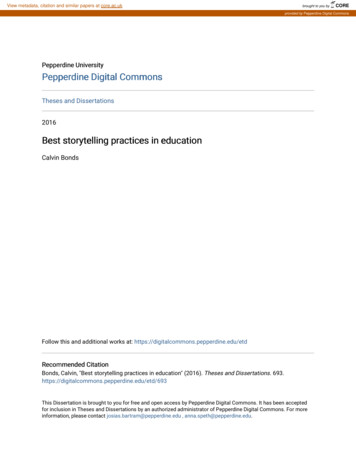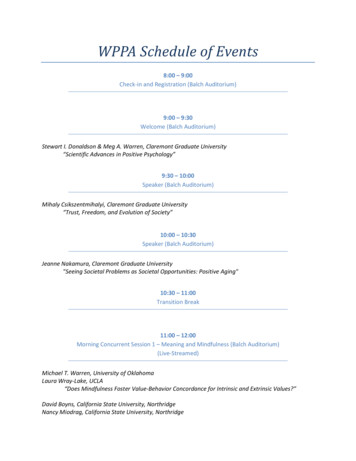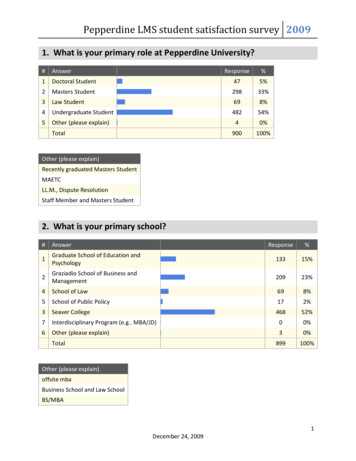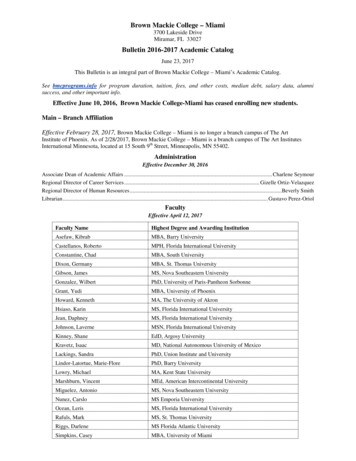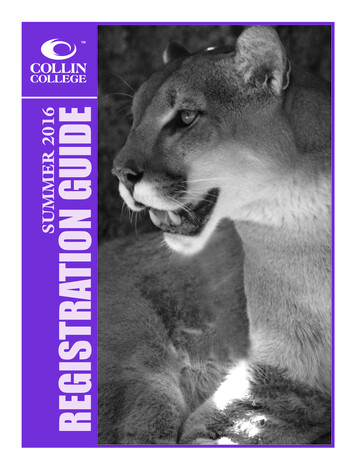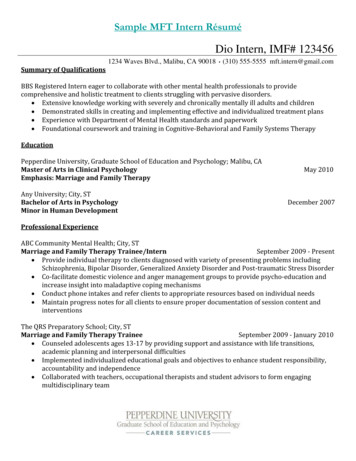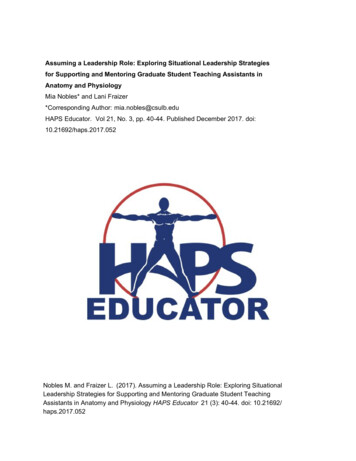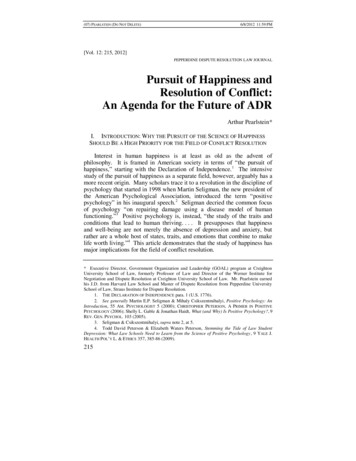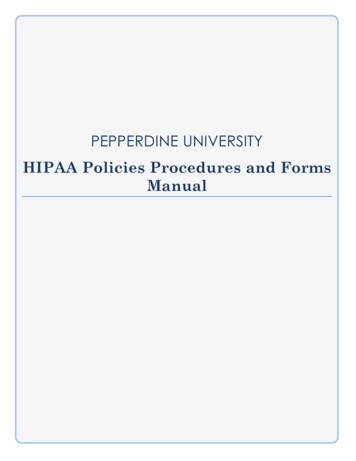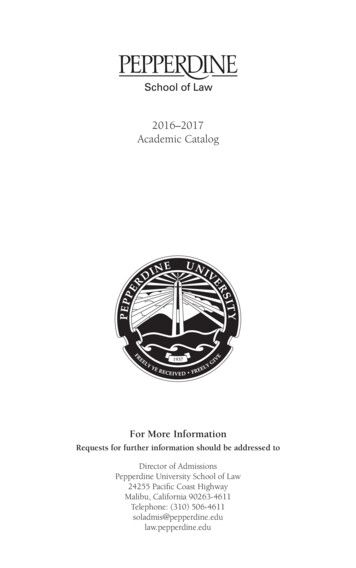
Transcription
2016–2017Academic CatalogFor More InformationRequests for further information should be addressed toDirector of AdmissionsPepperdine University School of Law24255 Pacific Coast HighwayMalibu, California 90263-4611Telephone: (310) 506-4611soladmis@pepperdine.edulaw.pepperdine.edu
Pepperdine is a Christian universitycommitted to the highest standardsof academic excellence and Christianvalues, where students are strengthenedfor lives of purpose, service, and leadership.As a Christian university, Pepperdine affirms:That God isThat God is revealed uniquely in ChristThat the educational process may not, withimpunity, be divorced from the divine processThat the student, as a person of infinite dignity,is the heart of the educational enterpriseThat the quality of student lifeis a valid concern of the UniversityThat truth, having nothing to fear frominvestigation, should be pursued relentlesslyin every disciplineThat spiritual commitment, tolerating no excusefor mediocrity, demands the highest standards ofacademic excellenceThat freedom, whether spiritual, intellectual,or economic, is indivisibleThat knowledge calls, ultimately, for a life of service
Table of Contents3CONTENTSCalendar. . . . . . . . . . . . . . . . . . . . . . . . . . . . . . . . . . . . . . . . . . . . . . . . . . . . . . . . . . . . . . . . . . . . . . . . . . . . . . . . . . . . . . . . 4Pepperdine University General Information. . . . . . . . . . . . . . . . . . . . . . . . . . . . . . . . . . . . . . . 7School of Law Faculty. . . . . . . . . . . . . . . . . . . . . . . . . . . . . . . . . . . . . . . . . . . . . . . . . . . . . . . . . . . . . . . . . . . . . 13School of Law General Information. . . . . . . . . . . . . . . . . . . . . . . . . . . . . . . . . . . . . . . . . . . . . . . . . . 71Parris Institute for Professional Formation. . . . . . . . . . . . . . . . . . . . . . . . . . . . . . . . . . . . . . . 77Straus Institute for Dispute Resolution. . . . . . . . . . . . . . . . . . . . . . . . . . . . . . . . . . . . . . . . . . . . . . 79Global Programs. . . . . . . . . . . . . . . . . . . . . . . . . . . . . . . . . . . . . . . . . . . . . . . . . . . . . . . . . . . . . . . . . . . . . . . . . . . 93The Herbert and Elinor Nootbaar Institute on Law, Religion, and Ethics. 94Global Justice Program. . . . . . . . . . . . . . . . . . . . . . . . . . . . . . . . . . . . . . . . . . . . . . . . . . . . . . . . . . . . . . . . . . 95The Geoffrey H. Palmer Center for Entrepreneurship and the Law. . . . . . . . 96Joint Degree Programs. . . . . . . . . . . . . . . . . . . . . . . . . . . . . . . . . . . . . . . . . . . . . . . . . . . . . . . . . . . . . . . . . 101School Policies. . . . . . . . . . . . . . . . . . . . . . . . . . . . . . . . . . . . . . . . . . . . . . . . . . . . . . . . . . . . . . . . . . . . . . . . . . . . . 105Admission Information for Juris Doctor Degree. . . . . . . . . . . . . . . . . . . . . . . . . . . . . . . . 106Financial Information. . . . . . . . . . . . . . . . . . . . . . . . . . . . . . . . . . . . . . . . . . . . . . . . . . . . . . . . . . . . . . . . . . 112Financial Assistance. . . . . . . . . . . . . . . . . . . . . . . . . . . . . . . . . . . . . . . . . . . . . . . . . . . . . . . . . . . . . . . . . . . . 120Student Life. . . . . . . . . . . . . . . . . . . . . . . . . . . . . . . . . . . . . . . . . . . . . . . . . . . . . . . . . . . . . . . . . . . . . . . . . . . . . . . 141Academic Programs and Policies. . . . . . . . . . . . . . . . . . . . . . . . . . . . . . . . . . . . . . . . . . . . . . . . . . . . 147Juris Doctor Requirements. . . . . . . . . . . . . . . . . . . . . . . . . . . . . . . . . . . . . . . . . . . . . . . . . . . . . . . . . . . 148Academic Policies. . . . . . . . . . . . . . . . . . . . . . . . . . . . . . . . . . . . . . . . . . . . . . . . . . . . . . . . . . . . . . . . . . . . . . . 148Academic Awards and Honors for Juris Doctor Students. . . . . . . . . . . . . . . . . . . . 153Legal Notices and Regulations. . . . . . . . . . . . . . . . . . . . . . . . . . . . . . . . . . . . . . . . . . . . . . . . . . . . . . 154Description of Courses. . . . . . . . . . . . . . . . . . . . . . . . . . . . . . . . . . . . . . . . . . . . . . . . . . . . . . . . . . . . . . . . . 159Required Courses for the Juris Doctor. . . . . . . . . . . . . . . . . . . . . . . . . . . . . . . . . . . . . . . . . . . . 160Elective Courses. . . . . . . . . . . . . . . . . . . . . . . . . . . . . . . . . . . . . . . . . . . . . . . . . . . . . . . . . . . . . . . . . . . . . . . . . 164Administration. . . . . . . . . . . . . . . . . . . . . . . . . . . . . . . . . . . . . . . . . . . . . . . . . . . . . . . . . . . . . . . . . . . . . . . . . . . . . 193Index. . . . . . . . . . . . . . . . . . . . . . . . . . . . . . . . . . . . . . . . . . . . . . . . . . . . . . . . . . . . . . . . . . . . . . . . . . . . . . . . . . . . . . . . . . 206Map. . . . . . . . . . . . . . . . . . . . . . . . . . . . . . . . . . . . . . . . . . . . . . . . . . . . . . . . . . . . . . . . . . . . . . . . . . . . . . . . . . . . . . . . . . . . 208
4Academic CalendarSchool of Law CalendarThe Pepperdine University School of Law academic year is divided into twosemesters that run 14 1/2 weeks each, excluding examination periods. Allunits are semester units. Classes will be held on all holidays not noted below.The School of Law reserves the right to amend the calendar as needed.Fall Semester, 2016August15–19First-year Professionalism Course (required)22 Fall semester classes begin; last day to registerwithout late registration penaltyAdd/Drop period beginsSeptember 2 Last day to drop courses without a “W”appearing on transcriptAdd/Drop period ends Last day to withdraw with tuition refunded at 100%5 Labor Day holiday (no classes)9 Last day to withdraw with tuition refunded at 75%(“W” on Transcript)16 Last day to withdraw with tuition refunded at 50%(“W” on Transcript)23 Last day to withdraw with tuition refunded at 25%(“W” on Transcript)24OctoberTuition refund no longer available7 University Faculty Conference (no classes except Strausintensive courses) Last day for JD/MDR students to allocate unitstoward each degreeLast day to petition for change in examination scheduleNovember 23 No classes24–25Thanksgiving holidayDecember 2 Last day of classesLast day to elect Pass/Credit/Fail option5–16 Study and final examination period; all classes adjourn17Winter holidays beginWinter Intensive Term, 2017January2 Winter Intensive classes beginAdd/Drop period ends3Tuition refund no longer available6Last day of classes
Academic CalendarTentative Spring Semester, 2017January9 Spring semester classes begin; last day to registerwithout late registration penaltyAdd/Drop period begins16 Martin Luther King, Jr. holiday (no classes)Signatures required for add/drop20 Last day to drop classes without “W”appearing on transcriptAdd/Drop period ends Last day to withdraw with tuition refunded at 100%27 Last day to withdraw with tuition refunded at 75%(“W” on Transcript)February 3 Last day to withdraw with tuition refunded at 50%(“W” on Transcript)10 Last day to withdraw with tuition refunded at 25%(“W” on Transcript)11Tuition refund no longer available24Last day to petition for change in examination scheduleMarch13–17 Study/Interview BreakSecond- and Third-year students (no classes)Appellate Brief project—First-year students (no classes)April24Last day of classesLast day to elect Pass/Credit/Fail optionApril 27–May 10Study and final examination period; all classes adjournMay19Graduation (subject to change)Tentative Summer Session, 2017MayJuly22293045610–13Summer session course beginMemorial Day holiday (no classes)Makeup Day for Monday May 25 classesJuly 4th holiday (no classes)Makeup Day for July 4Last Day of Summer sessionStudy and final examination periodStraus Institute for Dispute ResolutionMayTBDMay22–26May 24–July 9Hong Kong/Beijing Study TourBlock 1–One Week Intensive coursesExtended Course (Mediation Clinic)Block 2–Two Weekend Intensive coursesBlock 3–Two Weekend Intensive coursesBlock 4–One Week Intensive coursesBlock 5–Two Weekend Intensive coursesBlock 6–Two Weekend Intensive courses5
6
7PEPPERDINE UNIVERSITYGENERAL INFORMATION
8President’s MessagePresident’s MessageDespite the pundits of today who are criticalof higher education, I remain confident that thebenefits of an excellent education are amongthe few constants in this century of change andchallenge. And at Pepperdine University, I amequally confident in asserting that the benefitof a faith-inspired law education, one whichaffirms the importance of quality, studentcentered teaching, personal integrity, andthe value of your own spiritual journey, willprepare you abundantly for the career and lifeto which you aspire.Pepperdine has a glorious history set inmotion by a founder who had a unique vision not just for the young peoplewho arrived and enrolled in 1937 in South Los Angeles, but for you and thechallenges you now face in today’s increasingly dynamic world. As the sayinggoes, “Law school teaches you to think like a lawyer,” and at Pepperdine, thereis a passionate belief that lawyers must also think about serving their world,about considering creative paths to success and justice, and about representingclients and causes with a deliberately honed sense of integrity. Nearly 9,000of the world’s most conscientious law students have forged these skills atPepperdine’s Malibu campus, in the School of Law’s centers and institutes,and with unparalleled mentoring from a faculty nationally recognized for theiravailability and interest in your goals.As you consider the part you will play in society and the career you hope topursue, weigh carefully your law school choice and the investment a universitylike Pepperdine is determined to make in you. It is our responsibility to affordyou every opportunity to master the skills of critical thinking, writing, andresearch, to discover your calling, with access to faculty—distinguishedin their disciplines and professions—in an environment that is equippedfor learning.Welcome to Pepperdine, a distinctively different university. We pledge toprepare you well for a life of purpose, service, and leadership, if you will let us.Andrew K. BentonPresident
University Information9History of the UniversityPepperdine University is an independent, private Christian universityenrolling approximately 7,300 students in its five colleges and schools—SeaverCollege, the School of Law, the Graziadio School of Business and Management,the Graduate School of Education and Psychology, and the School of PublicPolicy. The University’s world-renowned main campus is located on 830acres in Malibu, California, overlooking the Pacific Ocean. Additionally thereare four graduate campuses located around Southern California, as well as aWashington, D.C., campus. The University also has permanent study abroadcampuses in Germany, England, Italy, Argentina, Switzerland, and China.The University was founded in 1937 by Mr. George Pepperdine, a Christianbusinessman who started the Western Auto Supply Company. For the first30 years of its life, the institution was a small, mostly undergraduate college.University status was achieved in 1970 as the institution added graduate andprofessional schools. In 1972, the University opened its new campus at Malibu.Pepperdine University is religiously affiliated with Churches of Christ, ofwhich Mr. Pepperdine was a lifelong member. Faculty, administrators, andmembers of the Board of Regents represent many religious backgrounds, andstudents of all races and faiths are welcomed. It is the purpose of PepperdineUniversity to pursue the very highest academic standards within a context thatcelebrates and extends the spiritual and ethical ideals of the Christian faith.Colleges and Schools of the UniversityThe School of Law provides an excellent legal education within a valuescentered context. It has an enrollment of approximately 700 students. Specialprograms include the acclaimed Straus Institute for Dispute Resolution;the Parris Institute for Professional Formation; the Palmer Center forEntrepreneurship and the Law; the Nootbaar Institute on Law, Religion, andEthics; and numerous clinical education offerings. The Global Justice Programand unique Preceptor Program contribute to the law school’s distinctiveapproach to legal education. Approved by the American Bar Association andholding membership in the Association of American Law Schools and theOrder of the Coif, the School of Law attracts students from around the nation.
10University InformationSeaver College is the University’s residential college of letters, arts, andsciences, enrolling approximately 3,300 undergraduate and graduate studentswho are expected to maintain the highest standards of academic excellenceand personal conduct. An interdisciplinary curriculum requires each studentto develop as a broadly educated person. Seaver College offers 44 bachelor’sdegrees, 8 master’s degrees, and 1 post-baccalaureate certificate program indiverse fields of study.The Graduate School of Education and Psychology enrolls approximately1,500 students. With its main headquarters located at the West Los AngelesGraduate Campus, the Graduate School also offers select programs atgraduate campuses in Encino, Irvine, Malibu, and Westlake Village as wellas online. The Graduate School of Education and Psychology offers master’sand doctoral programs in education and psychology which are founded onthe scholar-practitioner model. The education programs prepare leaders intechnological innovation and collaborative learning environments as well asthose who create vision and manage change in business, health, and othersocial service professions. Students in the psychology programs are educatedin current and emerging human service fields, including clinical psychologyand marriage and family therapy. The focus is placed on the practitionerscholar model of learning, with emphasis on discovery, scholarship, research,and clinical application. In conjunction with an excellent professionaleducation, students are provided with personal attention in a Christian,values-centered context.The Graziadio School of Business and Management is one of thenation’s largest graduate business schools accredited by the Association toAdvance Collegiate Schools of Business (AACSB International) and enrollsapproximately 1,900 students in its full- and part-time programs. Foundedin 1969, the school is named for its benefactor, the late cofounder, chair, andchief executive officer of Imperial Bancorp, George L. Graziadio. Its mission isto develop values-centered leaders and advance responsible business practice.Degree programs offered by the Graziadio School include the Master ofBusiness Administration (MBA) for full-time students, working professionals,and high-level executives; the International Master of Business Administration(IMBA); the Master of Science in Organization Development (MSOD); theMaster of Science in Management and Leadership (MSML); the Master ofScience in Global Business (MSGB); the Master of Science in Applied Finance(MSAF); the Master of Science in Human Resources (MSHR); the Master ofScience in Applied Analytics (MSAA); and the undergraduate Bachelor ofScience in Management (BSM). Special programs include a joint BSM andMBA program; joint degrees with Pepperdine University’s School of Law (JD/MBA), School of Public Policy (MBA/MPP), and Seaver College (BS/MBA, BS/IMBA, or MS in accounting); and certificate executive education programsthat can be customized to meet an organization’s specific learning needs.Degree programs are offered at the Graziadio School’s headquarters locatedat the West Los Angeles Graduate Campus; the Drescher Graduate Campus
University Information11in Malibu; and additional campuses located throughout Southern Californiaincluding Encino, Irvine, Santa Barbara, and Westlake Village. The ExecutiveMBA program also is available at the Silicon Valley campus.The School of Public Policy enrolls approximately 80 students and offersits Master of Public Policy (MPP) degree built on a distinctive philosophyof nurturing leaders to use the tools of analysis and policy design to effectsuccessful implementation and real change. This requires critical insightsbalanced with personal moral certainties that only a broad exposure togreat ideas, courageous thinkers, and extraordinary leaders can encourage.It prepares graduates for careers as leaders and seeks also to strengthen theinstitutions that lie between the federal government and the individual,including the family, religious organizations, volunteer associations, localand regional government, and nonprofit organizations. Joint degree programsinclude the MPP/JD degree and the MPP/MDR degree in conjunction with theSchool of Law and the MPP/MBA degree in conjunction with the GraziadioSchool of Business and Management. The Davenport Institute for PublicEngagement and Civic Leadership educates, researches, and promotes tocurrent and future public leaders the engagement of the greater public inmaking crucial local policy decisions. Along with current students, theinstitute works outside the classroom, training current municipal and civicleaders through regional seminars in skills development on issues rangingfrom participatory budgeting to planning.
12
13SCHOOL OF LAW FACULTY
14Dean’s MessageDean’s MessageWhen I chose to go to law school I could nothave foreseen that I would be a legal aid lawyer, apractitioner in large and small firms, a law teacher,a judge, and an academic administrator. So tootoday’s students cannot predict the many pathsthat a legal education will open for them. Therefore,Pepperdine University School of Law fashions thelaw school experience around building lawyersequipped personally and professionally to modelthe highest ideals of the profession in a myriad ofways that legal professionals may serve their clientsand society.Some of the debate swirling around legal education today centers on theneed to prepare lawyers for the employment experiences they will encounter.We agree that a modern legal education must combine a rigorous doctrinalgrounding with a wide array of experiential learning resources. The ParrisInstitute for Professional Formation allows each first-year law student toexplore the values that shape outstanding lawyers. The faculty possessesextraordinary credentials as both teachers and scholars and makes studentfaculty interaction a high priority. We place a special premium on honingthe legal writing and advocacy skills of our students. Our trial and appellatemoot court programs excel nationally. Our many, nationally recognizedclinical and externship programs place students in actual practice settings toobserve the work of lawyers. The Straus Institute for Dispute Resolution is thetop-ranked program in the nation and equips students for peaceful conflictresolution. The Palmer Center for Entrepreneurship and the Law propelsaspiring entrepreneurs to use their law degrees to reach exciting new horizonsin business, real estate, and the media. The Global Justice Program sendsstudents around the world to understand and serve the legal needs of thosewho need the help of lawyers so much.In short, Pepperdine is preparing lawyers to be leaders in a changingprofession and world. The vibrant environment of this law school encouragespersonal, intellectual, spiritual, and visionary growth. This is an exciting timeto be going to law school. Pepperdine is an exciting place to move into the legalprofession of the future.Deanell Reece TachaDuane and Kelly Roberts Dean and Professor of Law
Faculty15Robert AndersonAssociate Professor of LawBA, Claremont-McKenna College, 1997JD, New York University, 2000PhD, Stanford University, 2008Robert Anderson received his JD from NewYork University School of Law in 2000, and wasassociated with Sullivan & Cromwell LLP from 2000to 2003 where his practice focused on mergers andacquisitions and financial institutions regulation. In 2008, he received his PhDin Political Science at Stanford University, where his fields included AmericanPolitics, Political Organizations, and Political Methodology (Statistics).Professor Anderson’s primary research interests are corporate and securitieslaw, positive political theory of the judiciary, and quantitative and empiricalapproaches to law. In particular, he has worked extensively on modelingjudicial behavior and developing computational and empirical techniques foranalyzing corporate transactions and corporate governance.Jeffrey BakerDirector of Clinical Education and Associate ClinicalProfessor of LawBA, magna cum laude, Harding University, 1997JD, Vanderbilt University, 2000Professor Baker is the School of Law’s Directorof Clinical Education and is an Associate ClinicalProfessor of Law. He directs the clinical programwhich includes the legal clinics, externships andpracticum courses. He supervises and teaches the Community Justice Clinic,and he serves as the school’s pro bono director.In the Community Justice Clinic, Professor Baker practices with lawstudents to provide pro bono legal services to local nonprofits and internationalnongovernmental organization dedicated to justice, human rights, andcommunity empowerment among vulnerable and marginalized populations.The Clinic serves clients at work in fields of homelessness and poverty,gender-based crimes and women’s empowerment, sustainable agriculture andrainforest conservation, human trafficking and access to education, farmworker rights and access to justice.Professor Baker graduated from Vanderbilt University Law School beforereturning to his home state of Mississippi where he had a diverse trial andappellate practice in health care, mass tort, products liability, pharmaceuticalliability, medical malpractice, insurance, toxic tort and personal injurylitigation with the firm of Watkins & Eager. From 2006-2013, Baker wasan associate professor of law and Director of Clinical Programs at FaulknerUniversity Jones School of Law in Montgomery, Alabama, where he was
16FacultyProfessor of the Year in 2011-2012. At Faulkner Law, Professor Baker taughtthe Family Violence Clinic, designed and launched the Elder Law Clinic, andsupervised and taught the Externship Program, among other courses. ProfessorBaker is a mediator, and coached Faulkner Law’s national championship teamsin the ABA Representation in Mediation Competition.His scholarship addresses domestic violence and gender justice in families,including intersecting fields of moral philosophy, religion, legal history, socialscience, and multidisciplinary professional responses. Professor Baker speaksand writes regularly on clinical education, professional formation, publicinterest lawyering and social justice. He also edits the Clinical Law ProfBlog and is actively involved with the Clinical Legal Education Associationand the Section on Clinical Legal Education of the Association of AmericanLaw Schools.In Alabama, he received the Montgomery Advertiser’s Martin Luther KingSpirit Honors Award and the Justice for Victims Award from the area domesticviolence shelter. He has served as co-chair of the Montgomery County TaskForce on Domestic Violence, on the Pro Bono Task Force for the AlabamaState Bar, and on organizing committees for the One Place Family JusticeCenter. He also is an honorary member of the Montgomery County DistrictAttorney’s Office.In California, he serves on the boards of nonprofits committed to access tojustice and health care in vulnerable international communities. He is activelyinvolved in church, local public schools, and youth sports.He is a member of the Mississippi, Alabama and California bars.Stephanie BlondellAssociate Director, Straus Institute of DisputeResolution and Assistant Professor of Law andPracticeBA, with honors, Brown University, 1992JD, University Of Washington, 1996Professor Blondell is an Assistant Professor of Lawand Practice and Associate Director of the StrausInstitute for Dispute Resolution. Professor Blondellis the Director of the Master of Dispute Resolution Program in West LosAngeles. Professor Blondell teaches Mediation Theory and Practice, Psychologyof Conflict, Criminal Law, and supervises the Mediation Clinic. ProfessorBlondell also is a lead faculty for Mediating the Litigated Case in Washington,D.C. and internationally.Prior to joining the Pepperdine community, Professor Blondell served asthe Manager of the King County Alternative Dispute Resolution Program andInterlocal Conflict Resolution Group, a labor-management and public policymediation program serving a tri-county region in Seattle. Professor Blondellalso served as the Alternative Dispute Resolution Coordinator for the City
Faculty17of Seattle where she designed and implemented an employment mediationprogram for City government in a joint labor-management context. ProfessorBlondell was also the Court and Program Manager for the Dispute ResolutionCenter of King County, managing the mediation activities of twelve divisionsof the district court. In these capacities, Professor Blondell trained andsupervised the mediation practicum of over a hundred law students, attorneysand non-attorneys. It is here she developed a passion for passing on the faceof rigorous and mindful professionalism to new lawyers in a classroom andclinical setting.Professor Blondell has also served as an adjunct faculty at Seattle UniversitySchool of Law and as a faculty instructor in Negotiations at the Evans SchoolExecutive Masters in Public Affairs Program at the University of Washington.Prior to entering the field of mediation, Professor Blondell practiced criminaldefense and was a research attorney for the Federal Public Defender for theWestern District of Washington.Babette E. BoliekAssociate Professor of LawBA, California State University, Chico, 1987JD, Columbia University, 1998PhD, University of California, Davis, 2007Professor Boliek earned her BA with distinctionfrom California State University, Chico, her JD fromColumbia University School of Law and her PhD inEconomics from the University of California, Davis.While at Columbia, she was both a Harlan Fiske Stone Scholar and a John M.Olin Fellow for Law and Economics. Her doctoral, and much of her subsequentresearch, focuses on the theoretical and quantitative analysis of legal issues ofthe U.S. communications industry. Professor Boliek’s scholarly research alsofocuses on issues in administrative, antitrust, and communications and sportslaw. Professor Boliek clerked for the Honorable Michael B. Mukasey of the U.S.District Court for the Southern District of New York and is admitted to practicein the State of New York.Prior to joining the faculty in 2009, Professor Boliek served as a SeniorFellow at the Information Economy Project at George Mason University Schoolof Law, where she integrated her background in law and applied economicsto analyze media, Internet, and telecommunications issues. Professor Boliek’swork at George Mason followed and echoed her experience as a Fellow forthe Center for Communication Law and Policy, a joint research venture of theUniversity of Southern California Gould School of Law and the AnnenbergSchool of Communication. Prior to her scholarship posts, Professor Boliekpracticed corporate law at Friedman Kaplan Seiler & Adelman in New YorkCity. While in private practice, she worked primarily with clients in the mediaand telecommunications industries and her practice areas included mergersand acquisitions, corporate governance and corporate finance. At Pepperdine,
18FacultyProfessor Boliek teaches in the areas of contracts, antitrust, corporations, andcommunications law.Selina BrandtAssistant Professor of Legal Research and Writingand Associate Dean for Academic Success andEmployer RelationsB.S., cum laude, Oregon State University, 1987J.D., summa cum laude, Pepperdine University, 1992Professor Brandt graduated cum laude from OregonState University where she majored in Finance andminored in Economics. Later, she graduated summacum laude and first in her class from Pepperdine University School of Law.While at Pepperdine, she served as editor-in-chief of the Pepperdine Law Reviewand as a teaching assistant for a Legal Research and Writing professor.After law school, Professor Brandt practiced corporate and partnershiptax law for Latham & Watkins in Los Angeles and Orange County. She alsoworked briefly as a litigation associate for Debevoise & Plimpton in LosAngeles. Later, she returned to Pepperdine where she has served in a variety ofroles, including as the Assistant Dean for Career Development for the Schoolof Law, as an attorney for the University’s Center for Estate and Gift Planning,and as the current director and Assistant Professor of Legal Research andWriting for the School of Law’s Legal Research and Writing program. Sheworks closely with the Career Development Office on student employmentinitiatives and employee outreach efforts. She also teaches the third-year BarExam Workshop course.Mireille ButlerAssociate Professor of Legal Research and WritingJD, magna cum laude, Washington University, 1996JD, highest honors, University of Bordeaux, 1992Certificate in English Law, with distinction, WarwickUniversity, 1992Professor Butler holds two law degrees, one fromWashington University School of Law in St. Louis, andthe other from the University of Bordeaux in France.During her first year of law school in France, she was first in class of 1,700students, and while at Washington University, she was an articles editor for theWashington University Law Review. She received the Breckinridge Award duringher third year of law school, awarded to the students with the first and secondhighest GPA for that academic year, and she gr
History of the University Pepperdine University is an independent, private Christian university enrolling approximately 7,300 students in its five colleges and schools—Seaver College, the School of Law, the Graziadio School of Business and Management, the Graduate School of Education and Psychology, and the School of Public Policy.
